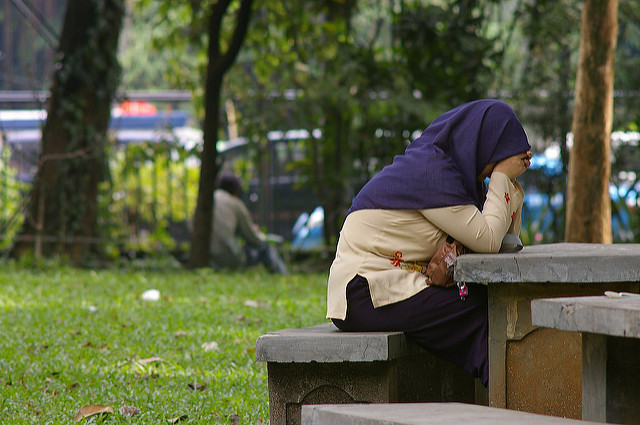It’s impossible to know the true extent of Indonesia’s suicide problem. Official records released by the World Health Organization said that there are 2.9 suicide deaths per 100,000 people in Indonesia in a 2015 report. That’s far lower than the 16 suicides per 100,000 people reported in Thailand. But experts say any suicide figures released in Indonesia likely only capture a small percentage of the total problem.
“There are indications that suicides are underreported because a lot of these cases aren’t registered in hospitals’ death records,” Dr. Fidiansyah, the Ministry of Health’s Director of Prevention and Control for Mental Problems and Illegal Drugs, told VICE Indonesia.
Videos by VICE
Suicide is still heavily stigmatized in Indonesia—so much so that many families are reluctant to even file the proper medical documents saying their loved one took their own life. There’s the shame of having a family member kill themselves, explains Fidiansyah, and then there’s the pain of going through a lengthy and invasive legal process only to have authorities tell you something you already know.
Then, once the investigation is done and the death is ruled a suicide, the bereaved families have to deal with a society that still treats mental illness as a sign of weakness. Depressed people just aren’t religious enough, they say. The souls of suicide victims are doomed to walk the Earth, they continue. It’s no wonder many families would rather just stay quiet.
But this decision, to keep suicides secret, makes it hard for health professionals to understand the real extent of the problem. And as long as society continues to stigmatize mental illness, the chance that someone dealing with depression can find the help they need remains small, experts say.
“People with depression or other mental illnesses are reluctant to talk about it due to the stigma,” Dr. Priska Primastuti, of the WHO, told local media. “Many people refuse to admit publicly that someone in their family has committed suicide. They don’t want to talk about it because it’s deemed taboo.”
The WHO set a target of reducing suicides worldwide by 10 percent by the year 2020. But here in Indonesia, any official plans to prevent future suicides will likely have little effect. The Ministry of Health once had its own suicide prevention hotline called Jangan Bunuh Diri!, or Don’t Kill Yourself!, but when VICE staff called the number it was already out of service. The ministry just doesn’t have the manpower it needs to keep the hotline running, Fidiansyah says.
“The hotline is now inactive because of limited resources for counseling,” Fidiansyah says. “Now the service has been shifted to the integrated emergency service system 119, but it no longer offers counseling. It’s just an emergency service for suicide attempts.”
Private nonprofits like Into the Light are now stepping in to fill the void. The organization offers counseling services via email to anyone who is feeling suicidal or depressed. Into the Light teaches people how to create a safe environment, and even stages suicide interventions as a last-ditch option, founder Benny Prawira Siauw says.
“In Indonesia, people tend to harass suicide victims or those who attempt to kill themselves,” Benny says. “Society always thinks they are weak, desperate, frustrated, or out of touch with God. They’re always seen as people who violate the norm. But we should be able to see this as a condition of mental illness.”
It’s a common perception that the country needs to correct, says Lidya Heryanto, a psychiatrist. Too often, people think that suicide is the result of bad parenting, low morals, or mystical spells, she explains. Indonesians need to be taught about mental illness, depression, and schizophrenia, so they can see the warning signs that someone is feeling suicidal.
“In Indonesia, people tend to associate things with either mysticism or culture,” she says. “For example, when someone commits suicide, people say they were possessed by spirits or that they lack faith in God. Meanwhile, we can actually help people, detect the problems, and lessen the risk. This is our challenge as healthcare providers. We need to educate society.”
If you or someone you know is considering suicide please take a moment and reach out to the kind suicide prevention staff at Into the Light either via this form or at pendampingan.itl@gmail.com. The organization is also on Facebook, Twitter, and Instagram.
And remember, a lot of us struggle with depression and dark thoughts.
You are not alone.
More
From VICE
-

Photo: Adrienne Bresnahan / Getty Images -

Photo: maiteali / Getty Images -

Photo: GK Hart/Vikki Hart / Getty Images

